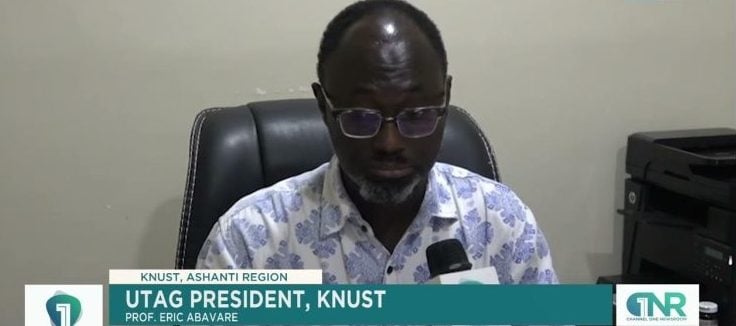Professor Eric Abavare, the President of the Kwame Nkrumah University of Science and Technology chapter of the University Teachers Association of Ghana (UTAG), faced significant controversy after labeling President Nana Addo Dankwa Akufo-Addo a “joker” in regards to the government’s ineffective response to illegal mining, known as galamsey. During his candid appearance on The Big Issue on Channel One TV on October 12, Abavare passionately criticized the president’s handling of this pressing issue impacting Ghana’s environment and economy. His remarks set off a wave of discontent from members of the ruling New Patriotic Party (NPP), particularly from Enoch Afoakwa, who argued that the description of the president was inappropriate and disrespectful.
In defiance of the backlash, Abavare affirmed his viewpoint while discussing the importance of effective governance for national success. He emphasized that as a Ghanaian citizen and an advocate for the country’s well-being, he had a right to voice disappointment over the president’s performance in tackling illegal mining. He asserted, “I want my government to succeed. I want my country to succeed, and if my government succeeds, that means my country also succeeds.” To him, this success is rooted in addressing systemic issues like galamsey, which not only threatens Ghana’s natural resources but also the livelihoods of many citizens.
Underlining the severity of the galamsey crisis, Abavare pointed to an environmental audit report by the Accountant-General, which revealed that less than 1% of the lands destroyed by illegal mining had been reclaimed. Citing this statistic, he argued that if he were to assess the president’s performance in a metaphorical academic setting, the president would fail with such dismal results. He provocatively questioned if it was unreasonable to call the president a joker considering these alarming figures. Abavare’s emphasis on accountability in governance resonated with many who feel let down by the current administration’s inability to control illegal mining operations that wreak havoc on Ghana’s land and water bodies.
Despite the controversy, Abavare expressed no regrets about his choice of words. Instead, he portrayed them as an earnest reflection of his disappointment regarding the government’s failure to implement meaningful solutions in the fight against galamsey. He defended his terminology by suggesting that strong language was needed to incite a sense of urgency and drive among both the government and the public to address this critical issue. His call for transparency and accountability is part of a broader discourse on the need for effective measures in combating illegal mining, particularly as it has drawn increasing international scrutiny and domestic anger over its repercussions on health and the environment.
The discussion around Abavare’s comments raises a larger conversation about the role of academic voices in political discourse. In democracy, academics often play a vital role in shaping public policy by critically analyzing government actions. Abavare’s remarks can be seen as a call to action not only for the government but also for civil society to engage in constructive criticism to hold the administration accountable. His insistence on rigorous evaluations based on credible data exemplifies a paradigm shift where empirical evidence and transparency should be at the forefront of governance, especially in natural resource management.
In light of these discussions, it is essential to consider the broader implications of addressing the galamsey menace effectively. Beyond political debates, the stakes involve protecting Ghana’s environmental heritage and ensuring sustainable development strategies. Public discourse like that led by Abavare signifies a wealth of intellectual engagement surrounding the topic, signaling that dialogues surrounding illegal mining must transition into actionable frameworks that not only critique but also suggest viable solutions for sustainable development in Ghana’s mining sector.














